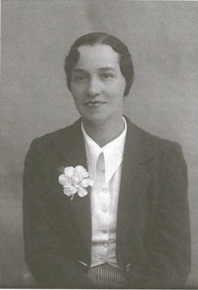One of first Italian women to come out as gay
The writer, poet and playwright Lina Poletti, who was one of the first gay Italian women to openly declare their sexuality, was born on this day in 1885 in Ravenna.
Poletti was an intellectual and
a feminist campaigner
Poletti, an active campaigner for the emancipation of women, had relationships with a number of high-profile partners, including the writer Sibilla Aleramo and the actress Eleonora Duse.
Her own works included the epic Il poemetto della guerra (The War Poem), many essays and lectures on her literary heroes, including Dante Alghieri, Giovanni Pascoli and Giosuè Carducci, and a number of collections of poetry.
One of four daughters born to Francesco Poletti and his wife Rosina Donati, who ran a business making ceramics, Lina’s birth name was Cordula. She was said to be a rebellious child, misunderstood by her sisters and something of a loner, often disappearing into the attic of their house in Via Rattazzi, or hiding in the tree house in the garden.
After finishing high school in Ravenna, she enrolled against her family’s wishes at the University of Bologna, where she became acquainted with Pascoli, a fellow student, and wrote a celebrated thesis on the poetry of Carducci.
By this time, she had changed her name, rejecting Cordula, which she disliked, in favour of Lina. She adopted an androgynous appearance, wearing her hair cut short and dressing in men’s clothes.
.jpg) |
| Sibilla Aleramo, who Poletti met at a congress for women in 1908 |
It was there that she met Aleramo, whose novel, Una donna, about the life of an oppressed woman in 19th century Italy, is regarded as the country’s first feminist novel.
The two shared a commitment to changing the subordinate position women held in Italian society and worked together on projects to provide education to rural peasants, as well as joining in with relief efforts in Calabria and Sicily following the catastrophic earthquake of December 1908.
Aleramo was in a relationship with Giovanni Cena, another writer, but began an affair with Poletti, which lasted around a year but ended when Aleramo tried to convince Poletti that she could love both her and Cena at the same time, which Poletti found difficult to accept.
The following year, Poletti married Santi Muratori, the director of the Biblioteca Classense in Ravenna, although they rarely spent a night under the same roof. In any event, she soon met Eleonora Duse, regarded as one of Italy’s finest actresses, who was suffering a personal crisis and had announced her retirement from acting.
 |
| Eleonora Duse, the actress, with whom Poletti had a stormy relationship |
However, the two began to have frequent rows, each displaying a volatile temperament and their relationship ended in acrimony and legal action as Duse demanded that Poletti hand over the manuscripts of the plays on which they had collaborated.
Poletti devoted the next few years to writing before entering another relationship - one that would prove more lasting - with Countess Eugenia Rasponi, a noblewoman from Ravenna almost 12 years her senior and an ardent fellow feminist.
She moved in with the Countess at the Palazzo Rasponi Murat, a 15th century palace that is one of the oldest in Ravenna. They hosted a Consiglio Nazionale delle Donne Italiane congress at the palace in 1921, after which they decided to move to Rome.
They invited philosophers and writers to their home on Via Giovanni Battista Morgagni but after organising a seminar for Jiddu Krishnamurti, an Indian philosopher who had spoken out against Fascism, they found themselves constantly under the scrutiny of authorities. Their home was raided frequently.
Nonetheless, it was an enduring relationship, lasting 40 years and ending only with the death of Rasponi in 1958. Poletti herself died in Sanremo, the Ligurian coastal resort, in 1971 at the age of 86.
_-_Facade.jpg)
The tomb of the poet
Dante, in Ravenna
Travel tip:
As well as being the former capital of the Western Roman Empire, Ravenna was also the city where the 13th century poet Dante Alighieri lived in exile until his death in 1321. Dante's tomb is next to the Basilica of San Francesco, not far from where Poletti grew up. The city is renowned for its wealth of well-preserved late Roman and Byzantine architecture and eight UNESCO World Heritage Sites. One of the most important examples of early Christian Byzantine art and architecture is the Basilica of San Vitale, which is famous for its fine Byzantine mosaics.
Travel tip:
Arcetri is situated in tree-clad hills to the
south of the centre of Florence
Arcetri, located in the hills south of the centre of Florence beyond the Arno river, is famous as the place in which the astronomer and physicist Galileo Galilei was kept under house arrest by the Roman Inquisition after refusing to accept that the earth was flat, a view that was considered heresy. The town is the home of the Arcetri Observatory. The 16th century writer Francesco Guicciardini, who compiled what is regarded as the first history of Italy, is said to have lived in a house in arcetri called Villa Ravà.
Also on this day:
410: Rome sacked by the Visigoths
1545: The birth of military leader Alessandro Farnese, Duke of Parma
1576: The death of the painter, Titian
1707: The birth of comic actress Zanetta Farussi, mother of Casanova